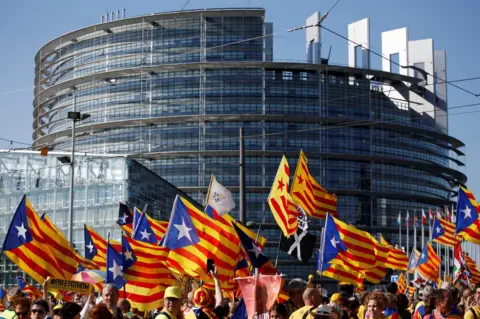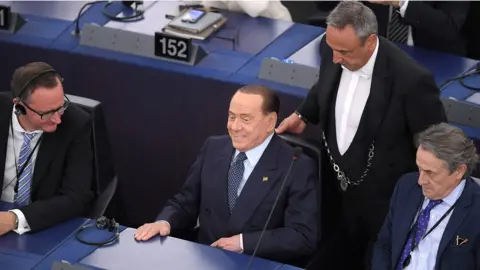European Parliament opens amid protest and discord
The European Parliament has re-opened in Strasbourg with an anti-EU protest by the UK's Brexit Party and a demonstration by Catalan nationalists whose MEPs are barred.
The first session after Europe-wide elections in May began as EU leaders went into a third day of talks on who should fill the bloc's top jobs.
A plan emerged on Tuesday to nominate German Defence Minister Ursula von der Leyen as Commission president.
An earlier compromise deal collapsed.
Ms Von der Leyen is being considered for the top job, while Belgian Prime Minister Charles Michel is being considered for the key role of president of the European Council, according to German website Die Welt and other reports.
Christine Lagarde is being cited as a possible new head of the European Central Bank. The French head of the International Monetary Fund served as economy minister during Nicolas Sarkozy's presidency.
What happened at the parliament?
Hundreds of Catalan demonstrators protested that three separatist figures were unable to take their seats, as inside the chamber fellow MEPs placed photos of the missing members on their desks.
 Reuters
ReutersEx-Catalan president Carles Puigdemont and colleague Toni Comin were barred from taking their seats because they had fled to Brussels after a banned referendum on independence went ahead and had not attended a swearing-in ceremony in Madrid as required. Another separatist leader, Oriol Junqueras, is in detention and on trial in Spain.
Irish Sinn Féin MEP Matt Carthy warned that the parliament's credibility would be undermined if it did not stand up for the voters of Catalonia.
As outgoing speaker Antonio Tajani convened the new session, MEPs rose for the EU's anthem, Beethoven's Ode to Joy, accompanied by a saxophone quartet. But not everyone stood, and anti-EU MEPs from the UK's Brexit Party turned their backs on the rendition.
Allow Twitter content?

"Rising to your feet is a matter of respect," said Mr Tajani. "It does not mean that you necessarily share the views of the European Union. Even when you listen to the anthem of another country you rise to your feet."
Their action came after party leader Nigel Farage promised a spirit of "cheerful defiance".
Pro-EU Liberal Democrats staged their own stunt, wearing "Stop Brexit" T-shirts.
Allow Twitter content?

 AFP
AFPWill there be a summit deal?
EU leaders reconvened in Brussels for their third consecutive day after a reported compromise deal that would have seen Dutch Labour leader Frans Timmermans head the Commission with centre-right Bulgarian Kristalina Georgieva taking the other key job of European Council president.
That deal fell apart when the four Visegrad states of Poland, Hungary, Czech Republic and Slovakia blocked the plan, with the backing of Italy. Czech Prime Minister Andrej Babis said Mr Timmermans was "unacceptable" and a "total catastrophe".
A new compromise emerged after hours of phone diplomacy involving EU leaders and outgoing Council President Donald Tusk, who was seen heading for the talks with his mobile phone to his ear.
After Italy's Giuseppe Conte said he would be very happy with a woman as Commission president, that idea gained ground when Ursula von der Leyen emerged as a possible candidate. She has not been considered a front-runner so far.
Why is it so hard to find a solution?
Political horse-trading has always been part of choosing the names for the top EU jobs, but EU elections at the end of May have shifted influence away from the two biggest groups in the European Parliament, the centre-right EPP and the Socialists and Democrats (S&D).
If the main post does go to the German defence minister, it is a defeat for the EPP's candidate Manfred Weber, but still a result for the party and for Angela Merkel's ruling CDU.
It is not just the Commission presidency that is part of the discussion. The leaders also need to agree on four other top posts:
- European Council president (to replace Donald Tusk)
- High Representative for foreign policy (to replace Federica Mogherini)
- European Parliament president
- European Central Bank president
The European Parliament will elect its president on Wednesday, placing further pressure on the EU leaders. MEPs will also have to approve the leaders' eventual nomination for Commission chief.
